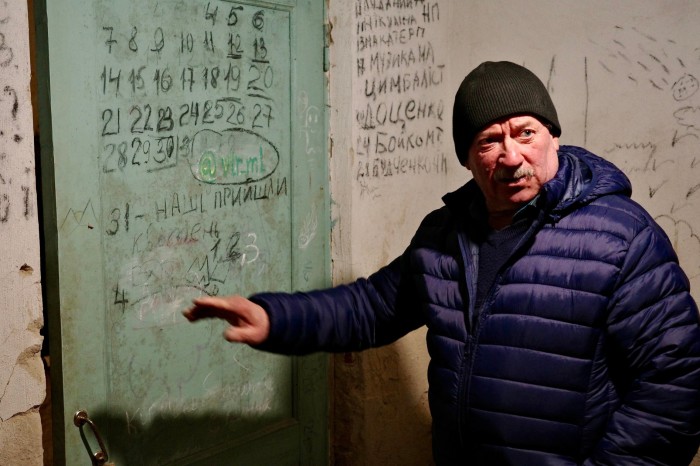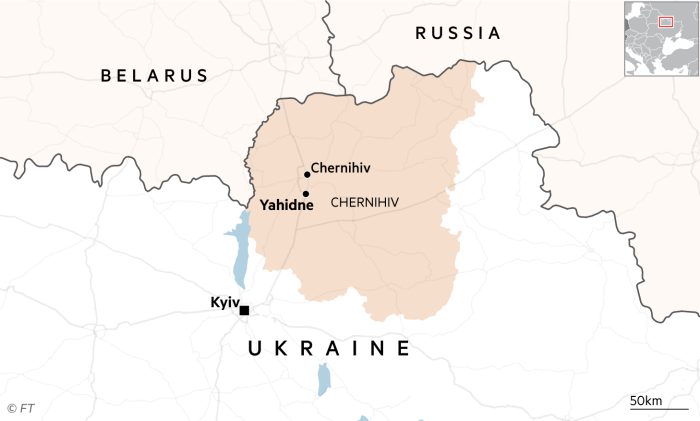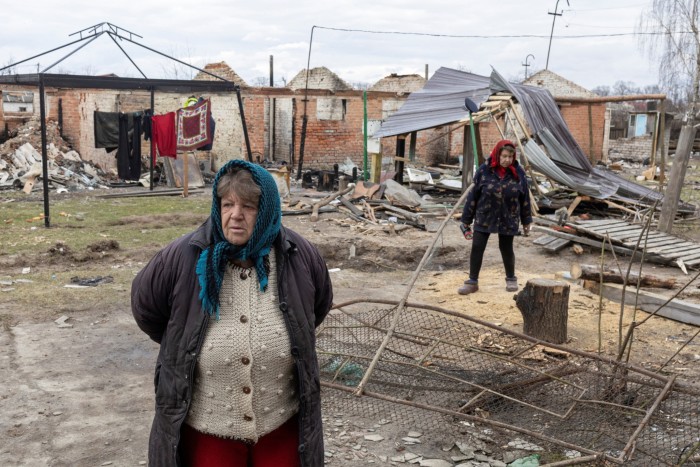
Stay informed with free updates
Simply sign up to the War in Ukraine myFT Digest — delivered directly to your inbox.
A Ukrainian court has convicted 15 Russian soldiers of war crimes in absentia two years after they crammed an entire village into a school basement, deprived them of sustenance and used them as human shields.
The harsh conditions forced upon 368 victims, including 69 children, in the Ukrainian village of Yahidne north of Kyiv, led to the deaths of 17 civilians. Surviving relatives and neighbours etched their names into the peeling basement walls.
On Monday, the Chernihiv District Court sentenced the Russian soldiers to 12 years in prison, bringing to a close the case of one of the worst recorded atrocities perpetrated by Russian soldiers since Vladimir Putin ordered the full-scale invasion of Ukraine in 2022.
“This is not merely symbolic justice. It’s also important that the whole world knows the names of those who committed these atrocities,” Andriy Kostin, Ukraine’s prosecutor-general, told the Financial Times after the ruling. “The in-absentia verdicts are the first steps for further prosecution of these crimes in international courts and future tribunals.”
But since the soldiers returned to Russia and may never see the inside of a Ukrainian prison, the judgment is unlikely to bring lasting closure to the victims who suffered in captivity for 27 days.

“Who will punish these soldiers in Russia?” asked Ivan Polhuy, a Yahidne resident who was among those held captive.
Russian authorities did not respond to a request for comment. Russia has denied its forces have committed war crimes in Ukraine despite overwhelming evidence and international arrest warrants for Putin and other officials.
Like Bucha, the town where Russian soldiers tortured and slaughtered civilians and left their bodies in the streets and buried in shallow graves, Yahidne serves as a symbol of Moscow’s brutality. President Volodymyr Zelenskyy has taken foreign delegations to both locations. US Secretary of State Antony Blinken visited Yahidne with Ukrainian officials in September.

Russian troops emerged from the forest around Yahidne on the afternoon of March 3 2022 as they were advancing towards the capital, which is about 140km south of the village.
The Russians numbered nearly 2,000, and they brought with them weapons small and large, including tanks, for which they dug revetments beneath the tree cover on the school grounds.
The soldiers shot and killed residents who refused to obey their orders, including to hand over their phones, Polhuy said. They frog marched hundreds of others to the school and forced people to move their elderly relatives in wheelbarrows.
The Russians turned the school into their headquarters and kept the villagers in the basement as human shields, knowing Ukrainian forces would not fire on a position where civilians were being held.
The youngest of the captives was a month old; the oldest was 93. Kept in darkness and without any ventilation, people fell ill within days — with colds, fevers, flu and stomach problems from drinking unfiltered water. Children spread chickenpox. There was no toilet, forcing everyone to share a few buckets.
There was little food, though the Russians eventually allowed some people to make a fire outside the basement door and to cook what they could scrounge. “But they told us, ‘No smoke or we’ll shoot you’,” Polhuy said.
Children who were allowed to go outside for a few minutes were so starved that they went through trash piles and ate mouldy scraps of food.
There was nowhere to lie down, so people slept standing against one another, breathing in the fetid air that grew ever more devoid of oxygen.
Polhuy still recalls how cruel the Russians were when they did not allow the corpses to be removed until at least five people had died.

The Russians left on March 30 after their failure to capture Kyiv. As they fled, the soldiers bolted the basement door and ordered the residents not to try to leave until sunrise.
“When we came up to the surface we were blinded by the light outside,” Polhuy said.
The school now exists as a museum of Russian atrocities, and its walls tell the horror story of Yahidne’s residents. Drawings made by the kids still adorn the basement walls, as does the first line of the Ukrainian national anthem: “Ukraine is not perished yet.” But in one room, the names of the seven people shot to death and 10 who died of exhaustion are scrawled around a door frame.
“People here still live in fear,” Polhuy said. With the Russian perpetrators on the lam, “they are afraid this will happen again”.

